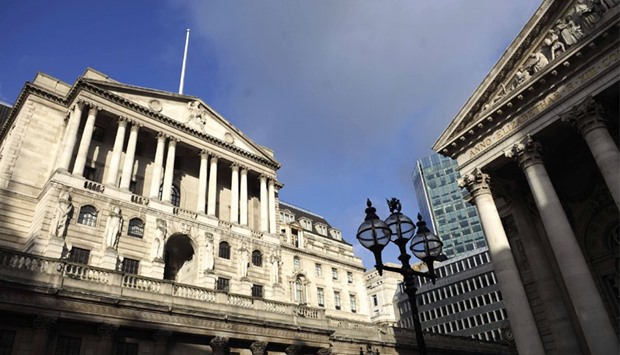The Bank of England, battling Brexit-fuelled inflation rises, is set Thursday to lift its key interest rate for the first time since 2007, according to analysts.
BoE policymakers are forecast to vote to increase the central bank's key interest rate to 0.50 percent from a record-low 0.25 percent after a regular gathering, mirroring policy tightening seen in the US and eurozone.
The BoE had cut borrowing costs to ultra-low levels during the global financial crisis and beyond 2008 -- and is now mulling a gradual path of monetary policy tightening to combat inflation rising far above the central bank's 2.0-percent target.
‘It's been over ten years since the last interest rate rise, so investors will have to dig deep in their memory banks to remember what one looks like,’ said analyst Laith Khalaf at stockbroker Hargreaves Lansdown.
‘While a rise in interest rates would mark the start of a new era in monetary policy, we do not anticipate too much disruption in financial markets, as the tightening stretch of the cycle looks like it will be long and shallow,’ he added.
A quarter-point increase would also reverse an emergency rate cut implemented in August 2016 on fears over the economic impact of the shock Brexit referendum, which did not materialise.
The bank's nine-strong monetary policy committee (MPC) had hinted at its last meeting in September that a hike was around the corner as a weak pound ramps up the cost of goods imported into Britain, and therefore consumer prices.
Recent official data showed Britain's annual inflation rate accelerated in September to 3.0 percent -- the highest for more than five years.
The BoE is not expected Thursday however to alter its quantitative easing (QE), or cash stimulus, policy, which it first embarked upon to encourage commercial lending after the financial crisis.
This would be in contrast to the European Central Bank, which last week began weaning the eurozone economy off the high doses of support they prescribed in recent years.
From January, the Frankfurt institution will reduce its purchases of government and corporate bonds to 30 billion euros ($35 billion) a month, from 60 billion at present.
In the US meanwhile, markets do not expect the central bank to raise benchmark interest rates Tuesday, but instead to move in December.
- 'Credibility on line' -
Kathleen Brooks, an analyst at City Index trading group, said ‘it is highly likely that the bank will hike rates otherwise its credibility could be on the line’.
She added: ‘The bank has been preparing the markets for this hike for some time, so if they do not pull the trigger it is likely to cause a wave of volatility in UK asset prices, and in the pound and gilt (bond) markets in particular.’
Higher interest rates boost savers who receive a higher return, while increasing repayments for borrowers.
The BoE will on Thursday also publish its quarterly UK economic growth and inflation forecasts.
The UK economy grew by 0.4 percent in the third quarter, recent data showed, gathering speed despite Brexit fears.
The outlook brightened Wednesday on news of an expanding manufacturing sector in October, according to the latest Markit/CIPS purchasing managers' index.
The BoE's chief regulator meanwhile warned on the eve of the central bank's rate decision that 10,000 financial services jobs could be relocated away from the UK on the first day of Brexit.
Britain is on course to leave the European Union in March 2019 -- but London still remains locked in tough exit negotiations with Brussels.
- 5.75% rate in 2007 -
The Bank of England last hiked rates in July 2007 to 5.75 percent, with inflation running at about 2.5 percent.
But as Britain slumped into recession as the crisis took hold, the BoE slashed its main rate to a series of record lows -- reaching 0.5 percent in March 2009, when it also launched its radical QE bond-buying scheme.
It currently has £435 billion ($578 billion, 498 billion euros) of cash stimulus pumping around the UK economy.

